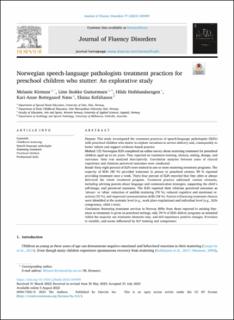Norwegian speech-language pathologists treatment practices for preschool children who stutter: An explorative study
Kirmess, Melanie; Guttormsen, Linn Stokke; Hofslundsengen, Hilde Christine; Næss, Kari-Anne Bottegård; Kefalianos, Elaina
Peer reviewed, Journal article
Published version
Permanent lenke
https://hdl.handle.net/11250/3092896Utgivelsesdato
2023Metadata
Vis full innførselSamlinger
Sammendrag
Purpose: This study investigated the treatment practices of speech-language pathologists (SLPs)
with preschool children who stutter to explore variations in service delivery and, consequently to
better inform and support evidence-based practice.
Method: 121 Norwegian SLPs completed an online survey about stuttering treatment for preschool
children aged up to six years. They reported on treatment training, choices, setting, dosage, and
outcomes. Data was analysed descriptively. Correlation analyses between years of clinical
experience and clinician perceived outcomes were conducted.
Result: Sixty-eight percent of SLPs were trained in one or more stuttering treatment programs. The
majority of SLPs (83 %) provided treatment in person in preschool centers; 59 % reported
providing treatment once a week. Thirty-four percent of SLPs reported that they often or always
delivered the whole treatment program. Treatment practice addressed various elements,
including advising parents about language and communication strategies, supporting the child’s
self-image, and perceived outcomes. The SLPs reported their clinician perceived outcomes as
‘always’ or ‘often’ reduction of audible stuttering (70 %), reduced cognitive and emotional reactions
(55 %), and improved communication skills (58 %). Factors influencing treatment choices
were identified at the systemic level (e.g., work place regulations) and individual level (e.g., SLPs
competency, child’s best).
Conclusion: Stuttering treatment services in Norway differ from those reported in existing literature
as treatment is given in preschool settings, only 34 % of SLPs deliver programs as intended
whilst the majority use treatment elements only, and still experience positive changes. Provision
is variable, and seems influenced by SLP training and competence.

